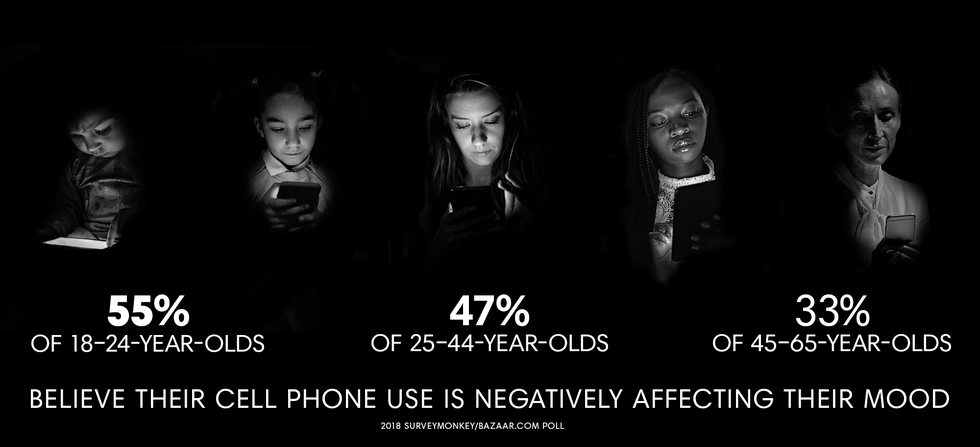One of my closest friends, Emma, is what you’d call a typical millennial: She’s 30, lives in New York City and has a senior-level job at an advertising agency that requires her to be tuned into the cultural trends of the moment. Still, on paper, she seems like less of an internet-addled young person than those described in the hysterical reports about the effects of social media. She is single but doesn’t really use dating apps; she has little difficulty meeting men in person. She has a Twitter and a Facebook that she checks occasionally, and an Instagram page she rarely posts on. She is not likely to be quoting tweets or shopping online. Whenever we hang out, she is engaged and composed, rarely checking her phone at inappropriate moments. When I try to summon the image of someone with a healthy relationship to her smartphone, I think of her.
And yet when I ask Emma, casually, to describe how she feels about her digital habits, I’m met with a response that blows me away: “I feel like my eyes are dying,” she says. She goes on to detail her innermost shame—obsessively checking the social media accounts of the friends of a guy who she had a casual fling with over a year ago—and grows despondent about being powerless to the pull of her smartphone. “It’s honestly driving me crazy,” she says.
When I float the internet question to an array of other friends and acquaintances, all of whom asked for their names to be changed because, they admitted, they would be more honest about how their phone addictions impacted their lives, they all give me similar responses. One neighbor of mine, Allison, a married 31-year-old freelance writer who has an admirable talent for blocking out social media when she is on deadline, still suffers the consequences of ever-present pinging and updating vicariously through her husband. “I’d say 80 percent of our fights are about his cell-phone usage,” she tells me.
I’d say 80 percent of our fights are about his cell-phone usage
Another friend, Kelsea, a PhD student in sociology, suffers from a similar perspective on internet addiction from inside of a relationship. She lives with her boyfriend, who teaches high school over an hour away. The pair use location-sharing on their devices. Sometimes, at night, if her boyfriend is later than usual, she’ll check his location—only to find that it shows him sitting in front of the house in his car, neck craned. “He’s just sitting there, on his phone,” Kelsea says. “He’s not responding to texts or anything—he’s just looking at memes.” In my relationship, the dynamic is reversed—I am the one constantly searching for down moments with my partner during which to check my phone. Sometimes I will catch myself lingering in the bathroom for an extra 20 minutes after I’ve brushed my teeth, idly scrolling through my social media feeds like a sugar addict digging through a pile of empty candy wrappers hoping to find scraps. “What were you doing?” my partner will ask when I’ve emerged, accusatorially. I can’t even tell him, because I don’t know.
This state of mindless, almost narcotized scrolling, is so prevalent that it becomes a default way of existing. Anyone who has looked at a smartphone for hours at a time will tell you how how powerful the smartphone-scroll inertia can be. One friend, Paloma, in her late 20s, has been trying to shed some extra weight for almost a year. She’s been mostly successful, undergoing a serious cleanse and signing up for a gym membership. But she says her phone is one of the most potent forces blocking her from achieving her goal. It’s a constant distraction: “I lay in bed skipping the gym,” Paloma tells me, “because I’m looking at skinny girls on Instagram.”
The idea of internet addiction and compulsion was first discussed formally over two decades ago by a University of Maryland psychologist named Jonathan Kandell, a man who was forced to write to a judge on behalf of a patient who was so consumed by the internet that she neglected to care for her children properly. At the time, the internet was fairly new, and so was the idea of internet addiction. A brief piece in the New York Times from 1996 concluded with a quote from Kandell: “I think we’re about a year away from having people recognize it’s a problem,” he said. “It’s out there. There’s no question.”
Fast-forward 22 years and saying that people are addicted to their phone is a bit like saying the Kardashians have a fondness for surgical enhancement. It’s not something we can outright confirm, but it feels like such an obvious statement that it’s almost not even worth making. We are not only connected, but we depend upon our internet addictions to function as a society. The internet has become so enmeshed in our everyday work and social lives that the idea of backing away from it seems unfathomable.
It’s this blithe acceptance of our internet compulsions as a simple fact of life that probably prevents us from applying the necessary skepticism to this life we’ve chosen.
I, for one, had expected my friends to return with simple anecdotes about how often they check their phones, confessions of nightmares about work emails, maybe even some gentle gestures of support for the utopian promises of an ever-connected universe. I did not expect such an outpouring of sheer panic, alarm and self-hatred—breathless statements about the ruinous impact that our devices have on our collective well-being.

Exposure to light, especially blue light emitted from electronic devices, can be harmful to one’s sleep cycle and health.
“I don’t think I’ve gotten a good night’s sleep since I got an iPhone in 2008,” admits Valeria, another friend who recently bought an analog alarm clock to avoid checking her phone at night. I ask her how the experiment is going. “It’s still in the box,” she says. These days, not only is she routinely checking her social media feeds during the night, but she has been online shopping using the recently installed Net-a-Porter apps. Now she buys Rick Owens sandals from the darkness of her bed to offset the bags under her eyes she’ll inevitably have in the morning.
DIGITAL DOZING
72% of 18-34 year olds
64% of 35-44 year olds
56% of 45-54 year olds
47% of 55-64 year olds…
sleep with their phone in or next to their bed
2018 surveymonkey/bazaar.com poll
It’s likely you’ve experienced some of the officially recognized effects of internet compulsion yourself: Anxiety, depression, euphoria while in front of a screen, difficulty keeping schedules, agitation, poor time management, deep feelings of social isolation. This sounds like the making of a public health crisis, and yet, there is no relief in sight. There are plenty of internet rehabilitation facilities in America, but still, the conversation about mental and physical well-being and internet is in its early stages. Internet addiction, for example, is not included in the DSM-5, the American Psychiatric Association’s handbook for mental disorders. Marc Potenza, a psychiatrist at Yale who has studied compulsive behavior for decades, told me that internet addiction has yet to be taken as seriously as other forms of addiction: “Compared to substance use disorders, we are at a much earlier stage. For us to develop better treatments that have support from randomized clinical trials, there’s going to need to be support, and the National Institute of Health has not always been as supportive of studying behavioral addictions as they have substance addictions.”
In its current state, internet addiction research focuses primarily on compulsion around gaming, gambling, and pornography—studying specific uses of the internet rather than the overarching issue itself. But if the internet can function like a drug, internet compulsion may be the first epidemic that is not just being ignored by authorities—it is being actively facilitated and encouraged. If we are dependent on our phones as individuals, our society and economy has become irreversibly dependent on our phone addictions. Checking our phones and responding to emails late into the night impresses our bosses; compulsive online shopping keeps the retail industry afloat; the glut of information we gather about current events and our friends on social media every day provides endless cocktail party fodder. Disengaging from the rat-race can feel like an act of self-destruction. (Not to mention that everyone’s request for anonymity in this story points to a cloud of shame that still exists around a habit so pervasive.)

Getty & Perri Tomkiewicz
In an attempt to find out just how addicted its own readers are, BAZAAR.com teamed up with SurveyMonkey to conduct a poll of 3,125 adults from different demographics, and the results showed some dizzying patterns. Almost three quarters of all millennial respondents said they sleep with their phones near or in their beds. More than two in ten respondents confessed to checking their phone compulsively, at least six times an hour. That’s once every 10 minutes. And still, despite our maniacal checking, 72 percent of respondents agreed that it’s “annoying” to try to have a conversation with someone who is using his or her phone. Younger respondents, however, were less turned off by people using phones during conversations.
Perhaps the most illuminating part of the survey was where respondents revealed what they’d be willing to give up for a week in order to keep using their phones. Nearly half of users said alcohol, while about 20 percent said they would give up their favorite food or music. A whopping 20 percent of users said they’d be willing to go without sex for seven days for smartphone use, evoking a grim image of celibate office workers, scrolling through social media feeds next to their partners every night, content to sacrifice orgasms in the name of tiny squirts of dopamine from strangers.
A whopping 20 percent of users said they’d be willing to go without sex for seven days for smartphone use
Like many of my friends, I get into frequent arguments with my boyfriend about our respective phone usage. To stare at an iPhone in front of a partner is to partake in some form of infidelity, whereby your attention is diverted from your loved one and redirected at hundreds of acquaintances and strangers. Sometimes I will catch myself actively siding with my phone over my boyfriend.
This problem is almost comically prevalent, says Vanessa Marin, a West Coast psychologist who specializes in sex and couples therapy. “It really shocking,” Marin told me. “Pretty much every single couple I work with, internet and phone habits come up. I feel like I’m a social media therapist as well as a sex therapist.” Marin went on to detail how phone time can impact couples’ connections—particularly in the bedroom. “One of the challenges I’ve dealt with clients is initiating sex,” she says. “When you see your partner fully engrossed in their cell phone, it makes it feel like there’s an even bigger gap that you have to jump over with your partner.” Marin often suggests couples instate a no-bedroom phone policy to mitigate this problem—a fix that is not as easy to implement as it sounds. “It’s a really, really hard one,” she says. “If that feels too extreme, I’ve had clients try it one night a week.”
And even more rudimentary than sex, smartphones and internet use can interfere with the basic levels of sexual attraction people have to their partners. My neighbor who is constantly fighting with her husband about his phone usage summed it up: “Sometimes, I really do feel abandoned and ignored,” she said, admitting that a lot of her anger is also aesthetic. “I hate seeing men in that bird-like, neck-at-a-90-degree-angle position. It’s the most potent vision of modern male weakness.”

“Anything could await me—an angry email from a boss, a stream of texts from an old friend, an inbox full of approving responses to a new Instagram story.”
Since the days of dial-up, contradictory impulses have grown powerful inside pretty much everyone with a phone: There is the desire to check the phone, matched only by the intense desire to throw the phone into the ocean forever.
I was an early adapter to the world of social media, creating a LiveJournal in ninth grade and following other high school girls—mostly in other cities—with similar taste in movies or clothes. No matter what happened at school, there was never anything more exciting than coming home to discover that one of my favourite LiveJournalers had posted a new account of her weekend, or that someone cool had “liked” one of my drivel-filled posts. But even then, I had the sense that I was doing something unnatural and toxic, that I was defenceless to a giant, time-sucking force. I had the same queasy suspicions about my time online that I did about drugs and alcohol. My friends and I would even hold competitions to see who could go the longest without checking LiveJournal, like middle-aged women going on the Master Cleanse, and we’d usually give up within a few days.
In lieu of regulatory forces—or some highly charismatic cult leader ready to pull us away from our phones—most of us are relegated to rigging our own systems of digital detox. One neighbour of mine, another 30-year-old woman, told me that, “like an alcoholic,” she spends “considerable mental energy devising systems of avoidance to the internet.”
Finding ways to dodge the internet’s toxic pull can feel like a full time job of its own
Finding ways to dodge the internet’s toxic pull can feel like a full time job of its own. There are growing cottage industries cropping up everywhere to help us navigate our own internet compulsions, but in a cruel twist of fate, many internet-avoidance programs must be downloaded via the internet, on a device. There are countless apps dedicated to tracking the average number of times we pick up our phones (according to Moment, I picked up mine more than 150 times in a day). There’s also a plethora of free or costly browser extensions and computer programs of varying strength that will block you from accessing certain websites. (My own problem-solving capabilities really shine when I’m trying to find ways around these applications.) And now the web-addled among us can pay to have the internet taken away from us, in some form of retreat. Many kinds of getaways are now valued for their ability to bring vacationers “off the grid,” free of pings from nagging colleagues and Instagram feeds. Even more hardcore are the getaways and retreats structured entirely around the idea of temporary internet-free living, with the promise of spiritual enlightenment. These range from the more rehabilitation and therapy-oriented offerings, like those at ReStart, a facility just outside Seattle, to the more luxe experience like Digital Detox, or any number of yoga retreats.
ALWAYS ATTACHED: A poll by BAZAAR showed 64% of participants check their phone up to 3 times and 36% check their phone up to 8 times.
2018 surveymonkey/bazaar.com poll
New York City is generally an awful place to try to go off the grid, and so there are very few opportunities to genuinely detox. As a result, my phone-resistance tactics typically take a few pathetic forms: If I’m on a stressful work deadline, I will purposefully leave my phone in a difficult-to-reach place turned off, to varying degrees of success. I deleted Instagram for a period of three months, only to start obsessively checking it from a friend’s account on my web browser. For a spell I became obsessed with Cal Newport’s theories of Deep Work and the need to completely disconnect from distractions of phone and web browsing in order to truly achieve success. (“If you keep interrupting your evening to check and respond to e-mail… you’re robbing your directed attention centers of the uninterrupted rest they need for restoration,” he writes.) I have experimented with using an alarm clock to avoid having my phone in the bedroom at night, but I am quick to give up on that, too. I dabble with airplane mode; I make arbitrary rules about how soon upon waking I’m allowed to check my phone, but mostly these tactics only result in more demoralization: Once I’ve failed, I am left with an even more acute feeling of powerlessness to the buzzing little monster in my pocket.

Gary Simmons, a partner at reSTART – a facility that aims to treat problematic use of digital technology.
Of course, internet abstinence feels a lot easier with the promise of relaxation and luxury as a reward. (I will admit to allowing myself online shopping in exchange for a prescribed period of internet-free work.) And so I was able to take a small step toward rehabilitation by signing up for a “Digital Detox” treatment at the Mandarin Oriental Hotel in Midtown, which is a new-ish service added to the hotel spa’s suite of well-being offerings. When you arrive, the receptionist gently requests your phone, which he or she cloaks in a pouch and tucks away in the safety of a back room. The service is pretty standard: you soak in a tub for 15 minutes, drink some shungite-infused water, do some breathing exercises and receive a 60-minute massage.
Of course, the idea of soaking in a tub or being massaged is nothing all that groundbreaking. I have serious doubts about the efficacy of the shungite water, but a placebo is better than nothing at all. The part of this service that feels truly detoxifying is the simple feat of being in a room without your device for a full 80 minutes, no ambient phone vibrations tormenting you from inside of your bag. For the phone addicts among us, these 80 minutes feel truly, alarmingly harrowing, and ultimately rejuvenating in a way that feels transformative.
Still, that relief is temporary. Some gentle spa music and a cushy robe is no match for years of digital dopamine-fiending. (Not to mention the panic that begins to snowball when you haven’t checked work emails or news alerts for 90 minutes.) When the session wrapped, the masseuse suggested I make use of the spa’s “relaxation room.” I contemplated for a moment, before getting changed back into my pedestrian clothes and heading to the front desk to retrieve my phone.
“You’re popular!” the receptionist exclaimed, handing over my pouched iPhone. “This thing was buzzing the whole time.” A disconcerting wave of panic and delight washed over me. Anything could await me—an angry email from a boss, a stream of texts from an old friend, an inbox full of approving responses to a new Instagram story. Eighty minutes had not absolved me of my compulsion to check in—with my inbox, my text messages, Instagram DMs, Twitter notifications, and more. If anything, the time I took to “detox” only amplified my craving and anxiety. Sure, we should probably wrench ourselves away from these devices—but a dramatic digital detox can be fruitless. I’d rather impose guardrails on smaller, more manageable chunks of time, depending on the circumstances (no phones at dinner, in bed, or before 9 a.m., perhaps). Before I’d even reached the elevators, I’d breathlessly scrolled through a tome of notifications, only to find that nothing all that exciting had happened while I was off the grid: A friend had given me the blow-by-blow of a job interview; my boyfriend informed me he was planning to eat leftovers for dinner, and several stores I don’t even like had emailed me announcing summer sales. I walked out of the hotel and into the sun, a bit dizzy and jittery, my thumbs twitching involuntarily, addicted as ever.
From: Harper’s BAZAAR US



